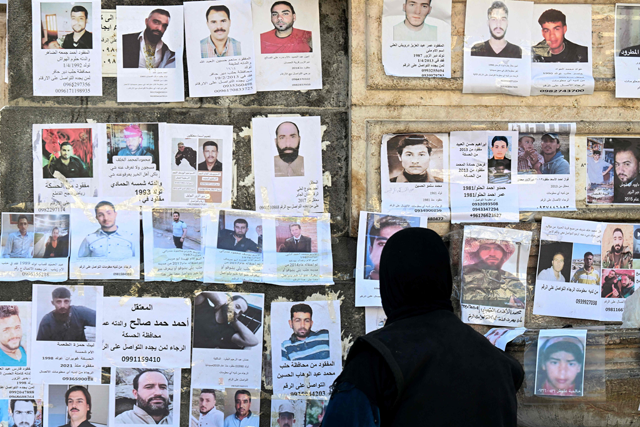DAMASCUS — The UN envoy to Syria called on Wednesday for "free and fair" elections after the ouster of president Bashar Al Assad, as he voiced hope for a political solution for Kurdish-held areas.
Assad fled Syria following a lightning offensive spearheaded by the Islamist Hayat Tahrir Al Sham (HTS), more than 13 years after his crackdown on democracy protests precipitated one of the deadliest wars of the century.
He left behind a country scarred by decades of torture, disappearances and summary executions, and the collapse of his rule on December 8 stunned the world and sparked celebrations around Syria and beyond.
Years of civil war have also left the country heavily dependent on aid, deeply fragmented, and desperate for justice and peace.
Addressing reporters in Damascus, UN special envoy Geir Pedersen said "there is a lot of hope that we can now see the beginning of a new Syria".
"A new Syria that... will adopt a new constitution... and that we will have free and fair elections when that time comes, after a transitional period," he said.
Calling for immediate humanitarian assistance, he also said he hoped to see an end to international sanctions levied against Syria over Assad's abuses.
Pedersen said a key challenge was the situation in Kurdish-held areas in Syria's northeast, amid fears of a major escalation between the US-backed, Kurdish-led Syrian Democratic Forces (SDF) and Turkey-backed groups.
Turkey accuses the main component of the SDF, the People's Protection Units (YPG), of being affiliated with Kurdistan Workers' Party (PKK) militants at home, whom both Washington and Ankara consider a "terrorist" group.
The United States said Tuesday it had brokered an extension to a fragile ceasefire in the flashpoint town of Manbij and was seeking a broader understanding with Turkey.
"I'm very pleased that the truce has been renewed and that it seems to be holding, but hopefully we will see a political solution to that issue," Pedersen said.
'We want to know'
Rooted in Syria's branch of Al-Qaeda and proscribed as a terrorist organisation by several Western governments, HTS has sought to moderate its rhetoric by assuring protection for the country's many religious and ethnic minorities.
It has appointed a transitional leadership that will run the country until March 1.
HTS military chief Murhaf Abu Qasra said Kurdish-held areas would be integrated under the country's new leadership, adding that the group rejects federalism.
"Syria will not be divided," he told AFP, adding that "the Kurdish people are one of the components of the Syrian people."
HTS has also vowed justice for the crimes committed under Assad's rule, including the disappearance of tens of thousands of people into the complex web of detention centres and prisons that was used for decades to silence dissent.
"We want to know where our children are, our brothers," said 55-year-old Ziad Alaywi, standing by a ditch near the town of Najha, southeast of Damascus.
It is one of the locations where Syrians believe the bodies of prisoners tortured to death were buried -- acts that international organisations say could constitute crimes against humanity.
"Were they killed? Are they buried here?" he asked.
Syrian civil defence official Ammar al-Salmo said unidentified human remains had been discovered in a medicine warehouse just 50 metres (yards) from the Sayyida Zeinab shrine, a revered pilgrimage destination for Shiite Muslims in the southern suburbs of Damascus.
The area was heavily guarded by pro-Iran fighters before Islamist-led rebels captured the capital on December 8.
"In the warehouse, we found a refrigerated room containing decomposing corpses," Salmo said, adding that some appeared to have died more than a year and a half earlier.
According to the Syrian Observatory for Human Rights war monitor, more than 100,000 people died or were killed in custody from 2011.
'Direct engagement'
The country's new rulers have sought to keep its institutions going and, on Wednesday, a commercial flight took off from Damascus airport to Aleppo, the first since Assad was toppled and fled to Russia.
They have also stepped up contacts with countries that had long seen Assad as a pariah, and with international institutions.
EU chief Ursula Von der Leyen said the bloc would intensify its "direct engagement" with the new administration.
Members of the UN Security Council, which Russia as well as the United States, called on Tuesday for an "inclusive and Syrian-led" political process.
"This political process should meet the legitimate aspirations of all Syrians, protect all of them and enable them to peacefully, independently and democratically determine their own futures," a statement said.
It also "underlined the need for Syria and its neighbours to mutually refrain from any action... that could undermine each other's security".
Israel has carried out hundreds of strikes on Syrian military assets since Assad's overthrow in what it says is a bid to prevent them falling into hostile hands.
Israeli troops also occupied strategic positions in a UN-patrolled buffer zone in a move UN chief Antonio Guterres described as a breach of a 1974 armistice.
